Gerry McElhinney was the dazzling young star of the Derry side that claimed back to back Ulster titles in 1975 and 1976. The Park man’s intercounty tenure lasted only four years before moving on to play professional soccer in England. He spoke to Chris McCann about a career that saw him go toe to toe with Jimmy Keaveney, Jack O’Shea, Mark Hughes, Karl Heinz Rummenigge and Brian Robson . . .
*****
The brightest stars burn the fastest. Few players in the history of Gaelic games in Derry have made as immediate an impact as Gerry McElhinney. His senior intercounty football career lasted only four years and was over before his 22nd birthday as he made the transition to professional soccer in England.
But for a couple of seasons in the mid-seventies the Banagher man was the star attraction in Ulster football as Derry collected their only ever back to back Ulster titles.
As McElhinney recalls, there where hints as to where his sporting destiny would ultimately lie evident even on the day he made his senior debut for Derry.
“I made my debut in a McKenna Cup game in 1974 against Antrim. My dad had to go to the airport to pick me up and bring me to Magherafelt as I had been over on trial at Celtic that week. I remember that Gerry Armstrong, who I’d later play with for Northern Ireland was playing on the Antrim team that day. I was still a minor at that stage,” he said.
One might have expected week which started at Parkhead and finished with a senior county bow, to overwhelm the youngster, but not a bit of it.
“To be honest it didn’t faze me at all I just trained and played, I loved it. I’d have been on the go six days a week. Sometimes on a Saturday I’d play two soccer games and then play two football matches on the Sunday. I’d maybe box a couple of times in the week as well, when you’re that age you should be fit for anything,” explained the Park man.
By the following year the teen sensation was the star attraction in the Derry side as they took on Down in the Ulster Senior Championship final. Even that didn’t induce any nerves Banagher player.
“I suppose what I remember is the final against Down and it was a match we weren’t expected to win. But it was an experienced Derry side. Boys like Seamus Lagan and Laurence Diamond had been playing for Derry for along time and knew what they were about. They treated me well, they never treated me like I was kid, I was part of the team and expected to do a job. I never felt any pressure playing sport, it was something I looked forward to. I always slept really well the night before a big game, even going down to Croke Park for big matches I wasn’t nervous.
I suppose that’s just my nature, laid back.”
The fact that McElhinney was far from overawed was evident in his display as he lashed home and finished with 1-2 from wing-half forward.
“I can remember walking behind the band in Clones and just looking forward to the game. I took a few knocks off McCartan and the like but you just get up and get on with it. Funnily I remember the only thing bothering me was that I had a cut on my finger. I suppose I did alright that day, got a goal and two points, I remember Sean O’Connell playing me in for the goal and smacking it to the net.”
Provincial success took Derry on to headquarters, where a clash with Kevin Heffernan’s legendary Dublin side lay in wait. The Oak Leaf Champions eventually fell to a 3-13 to 3-8 defeat to the Dubs but only after pushing them hard for an hour.
“The semi-final against Dublin was good game. For most of the match it was tit for tat, they got a late goal from Anton O’Toole which proved decisive. They were a very good team, they’d players like Tony Hanahoe and Brian Mullins. Jimmy Keaveney could slot 50s like he was kicking right in front of the posts. John McCarthy, Sean Larkin, Paddy Cullen they were some outfit and they were the first team to play the close handpassing style of play that’s so normal today. It was completely different from anything we’d ever come up against.”
Frankie Kearney’s men may have come up short in their quest for national glory but Derry had made their mark and were recognised with three Allstar awards. McElhinney became then the youngest ever recipient joined by his skipper Peter Stevenson and Lavey’s Anthony McGurk, no mean achievement in a year when Kerry and Dublin met in the All-Ireland final.
“Peter Stevenson was a great leader, Anthony McGurk was a super player he’d could play anywhere in defence of attack, he’d already won an Allstar in 1973. Anthony was so versatile he’d have been well suited to today’s game.”
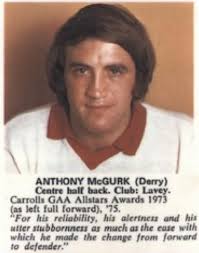
Expectations of further Championship success for Derry were fuelled when they reached the final of National League in 1976 where they were given an early chance of avenging that defeat to Dublin. Derry produced probably their best display since defeating Kerry in the All-Ireland semi-final of 1958 but ended up on the wrong end of a narrow defeat 2-10 to 0-15.
“We really should have got something from that game. We were coming at them in waves in the final whistle and Fintan McCloskey was hauled down, it was a definite free and Brendan Kelly would definitely have slotted it and got us a draw. I suppose it just wasn’t to be.”
Still Derry and McElhinney carried their promising league form into the Ulster Championship. Armagh were hammered by 1-19 to 2-1 in the first round and Tyrone were seen off in more prosaic fashion 0-8 to 0-12 to set up a provincial showpiece against Cavan which resulted in a draw at 1-8 apiece. The replay was an epic with McElhinney playing through the pain barrier as an Ulster final went to extra-time for the first time.
“The thing that sticks in my head from the replay in 1976 is that I was struggling with a hamstring, but I got patched up and played. I remember thinking when the game went to extra-time that I wasn’t going to be able to make it through. Cavan were a good side but and the other thing I remember was that it was really warm day but we won the game and that was back to back Ulsters. That was fair achievement, there was no backdoor then and the provincial finals maybe meant a bit more than maybe they do now.”
The semi-final saw Derry take on the greatest side ever to grace a football field. And while McElhinney achieved the notable feat of shading his battle with Jack O’Shea at midfield there was no denying a Kerry team who ran out 5-14 to 1-10 winners despite a super display from Derry keeper John Somers.
“The thing is that the first half of that game was very close we led by 0-9 to 0-8 at half-time. But in the second half have they ran us ragged. They were a lot better than us but then that was the great Kerry side of Mickey Ned O’Sullivan and Pat Spillane and Jack O’Shea.”
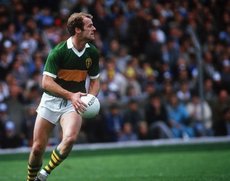
That was the final game at Croke Park for one of the great Derry sides as the team broke up. McElhinney, still only 20 at the time, might well have played for his county for another decade but by the time his 22nd birthday came around he’d donned the red and white for the last time.
“I played my last game for Derry in 1978. I spent quite a bit of time in American, Philadelphia and Chicago towards the end of the 70s. I ended up playing against a lot of guys I knew from the Ulster Championship, Tyrone men like Frank McGuigan and Brendan Donnelly. I played for Cavan in Philly and in Chicago I played for Connemara Gaels, I also played in New York for Sligo with Martin Murphy from Feeny, another Banagher man.”
But it was in another code that McElhinney would continue to hit the headlines as his soccer career began to take off.
“I never had any coaching at soccer it was just something I played for fun. I played underage soccer for Derry City in 1972 and that was how I got started. Celtic had a scout Sean Fallon from Sligo and he was friends with the Derry City chairman Johnn Ross and he spoke to him about me and I went for a few trial games. I was there on and off for around nine months. I spent sometime on loan at Finn Harps where I played in goal believe it or not.”
But it was while playing for Distillery in the Irish League that the former county star’s athleticism and determination as a central defender earned him a shot at life as a full-time sportsman.
“Distillery was really the only team that would have me. I remember writing to a lot of clubs and Gibby McKenzie, who was the main man at the club, gave me a chance. I played there for two seasons, although I disappeared to the States for a while but Gibby got me back and eventually I was offered a trial at Bolton. I went over for a one-off game and the upshot was that they signed me for a fee that eventually came to £45,000.
“I signed for Bolton in August and made my first-team debut in October. Bolton had just been relegated from the old First Division which was the equivalent of the Premiership and they were a good side,” he said.
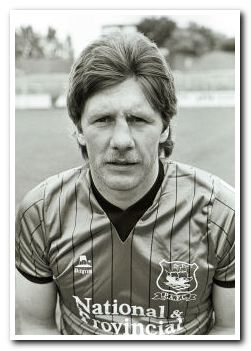
McElhinney’s performances at Burnden Park quickly attracted the attention of Northern Ireland boss Billy Bingham and he was placed on stand-by for the 1982 World Cup but missed out to a youngster called Norman Whiteside.
Still, an international call-up wasn’t long in coming and what a debut it proved. McElhinney blunted the attacking threat of Bayern Munich legend Karl Heinz Rummingge as the North stunned reigning champions West Germany in a European Championship qualifier in Berlin thanks to Ian Stewart’s goal.
“Germany were good and I remember thinking about how good their passing was but that Northern Ireland side had some great players in it Gerry Armstrong, Martin O’Neill, Pat Jennings, Sammy McIlroy and Mal Donaghy. When you have players like that alongside you, you don’t feel any fear. It’s probably the fastest 90 minutes of my life, you’re just concentrating so hard, putting your boot in making the next tackle or the next header,” explained McElhinney.
Next up for the McElhinney was the old Home International Championship, the final time that old competition was contested. Now 27 and at the height of his powers he played in all three games, a win over Scotland and 1-0 defeat by England at Wembley and a 1-1 draw with Wales as Northern Ireland claimed the title.
“That was a great experience I got to play against some great players, Mark McGhee and Graeme Souness for Scotland, Brian Robson was playing for England at the time and when we came up against Wales they had Ian Rush and Mark Hughes playing up front. We won that tournament and it was the last time it was played so I suppose that team can still count themselves the reigning Champions,” he said.
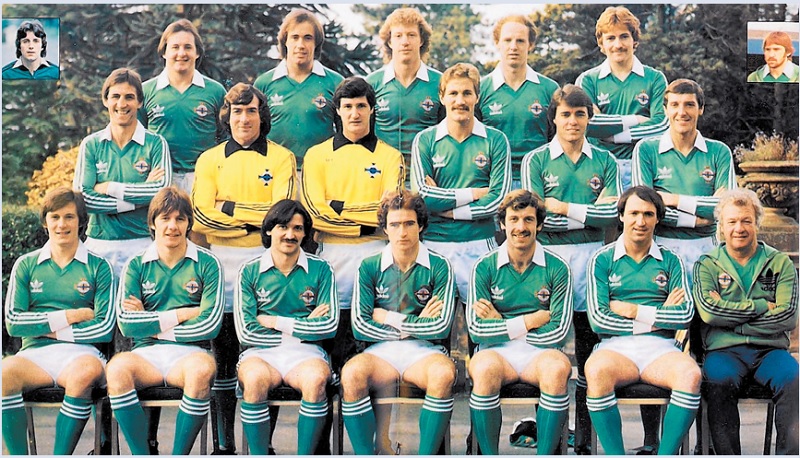
McElhinney would win only two more caps after that in World Cup qualifiers against Finland and Romania, suffering the misfortune of seeing his six-cap international career fall between two World Cup tournaments but he has no regrets.
“The problem was that Northern Ireland had so many good central defenders at that stage, you’d Chris Nicholl, John O’Neill and John McClelland. Of course I’d love to have gone to a World Cup but I’m more than happy with the six caps that I won.”
While his international career came to a close in 1984 McElhinney continued to play at club level until the mid 1990s with Bolton, Rochdale, Plymouth, where the fans christened him ‘Rambo’, and Peterborough. He battled on gamely for three seasons with Posh, before joining the club’s coaching staff. Later he would return to the playing field with non-League Corby Town, where he was also joint player-manager in the mid-1990s. Having taken his UEFA B License the former Oak Leaf star had a spell working at Derby County’s Academy and was recently a guest of Bolton Wanderers at their Premiership clash with Wigan Athletic.
Yet despite his successes in “ground football”, McElhinney, who now works for a Chemical company outside Derby, still keeps a close eye on the GAA scene in his native county.
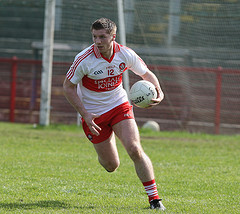
“Of course you miss the Gaelic when you’re over here but I still keep in touch. I was on Hill 16 when Derry won the All-Ireland in 1993 and I’m always in the Irish club watching games when they’re on television. Whenever I’m home I would still get to the odd game, Eddie (McElhinney’s younger brother and an All-Ireland minor winner in 1983) and Ciaran would have been involved with the club football in recent years.”
With the younger brother Ciaran now retired from playing duties, McElhinney still has plenty of family connections to maintain the bond with football in Derry. Four of his nephews are talents up in Craigbane, Bliain and Ruairi Gormley and Carlos and Christian McElhinney.
Indeed it may be over 35 years since he kicked a ball in the red and white of his county but Gerry still seems to have his finger on the pulse of the game in which he first rose to prominence.
“The game has changed it’s become more tactical and it’s not as physical as it once was, which isn’t necessarily a good thing. I always enjoyed the give and take of the big hits.
“Derry have had some excellent players in recent times and there’s a good crop of young players coming through. That’s the way of it I suppose there’s always new talent coming through and there’s always a new hero.”
That’s as maybe, but for a generation who watched Derry in the mid-1970s the new hero will remain the long-haired teenager from Park with the headband who shone briefly in the Gaelic arena before making his name on foreign fields.

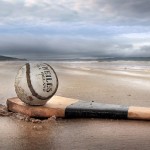
Comments